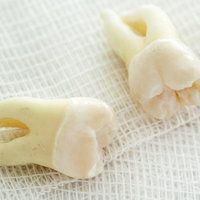Dentists Still Lack Evidence for Asymptomatic Third Molar Removal
A recent research review looked at the benefits of removing asymptomatic wisdom teeth. The results might surprise some dentists.

Third molars, commonly referred to as wisdom teeth, typically erupt either fully or partially in patients between the ages of 17 and 26. Dentists know that many patients have multiple problems when this occurs — wisdom teeth can become wedged against second molars, with symptoms ranging from swelling to tooth decay. In these cases, wisdom teeth are promptly removed.
If a patient has wisdom teeth, but are not experiencing any adverse effects related to them, should the third molars still be removed? A
recent review of previously published research
explored this question and came to the conclusion that there was no benefit to patients in removal of wisdom teeth, unless they are explicitly causing pain or other problems.
For the review,
researchers looked for studies
comparing outcomes, such as the likelihood of various dental problems, after disease-free, impacted wisdom teeth were either removed or retained. Only two studies were found that met this criteria, and neither study measured outcomes like cost, cyst or tumor formation, bleeding, nerve damage, or infection. One of the studies showed that men who still had impacted wisdom teeth may have had a higher risk for gum disease around the adjacent molar compared to men who had their wisdom teeth removed. Another study found no evidence of any notable differences between people that had impacted wisdom teeth removed compared to people who did not.
If third molar extraction is not performed because a patient is asymptomatic, the patient might have to have surgery later on when the teeth do become symptomatic. This might lead to more surgical complications due to the older age of the patient. One of the review study authors, Hossein Ghaeminia, said, “on the other hand, preventive removal of all asymptomatic wisdom teeth is also undesirable: if the tooth would stay asymptomatic and disease free during lifetime, the patient might have been exposed to an unnecessary risk of complications and costs.”
Wisdom teeth removal is still very common in the United States and across the world. This surgical procedure is covered by most dental insurance plans but is usually not covered by medical insurance. Infection, inflammation of the tooth socket and temporary nerve injury causing impaired sensation of the lip and chin are the most common risks of the procedure.
The review study authors acknowledge that the lack of evidence indicating the benefit of asymptomatic third molar removal in patients should lead to greater discussion of both options with dentists. Ghaeminia noted that, “in the absence of evidence, orthodontists, dentists and oral surgeons should discuss the pros and cons of wisdom teeth removal in each case individually."